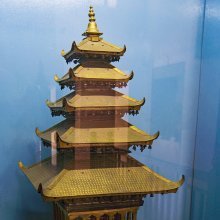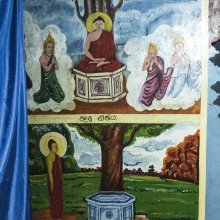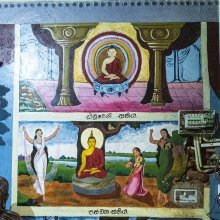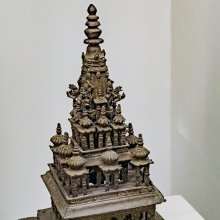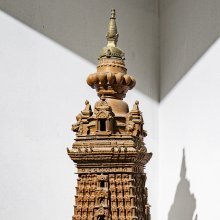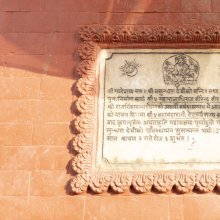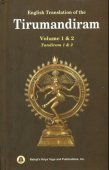Mandira, Mandirā, Mamdira: 24 definitions
Introduction:
Mandira means something in Hinduism, Sanskrit, Jainism, Prakrit, Buddhism, Pali, Marathi, biology. If you want to know the exact meaning, history, etymology or English translation of this term then check out the descriptions on this page. Add your comment or reference to a book if you want to contribute to this summary article.
Mandira has 23 English definitions available.
Images (photo gallery)
(+4 more images available)
Languages of India and abroad
Sanskrit dictionary
[Deutsch Wörterbuch]
Source: Cologne Digital Sanskrit Dictionaries: Böhtlingk and Roth Grosses Petersburger WörterbuchMandira (मन्दिर):—[Uṇādisūtra 1, 152.]
1) n. Behausung, Gemach, Haus, Wohnung, Burg, Palast, Tempel; = gṛha, agāra [Amarakoṣa 2, 2, 4. 3, 4, 25, 186.] [Hemacandra’s Abhidhānacintāmaṇi 990.] [Anekārthasaṃgraha 3, 589.] [Medinīkoṣa r. 198.] [Halāyudha 2, 136.] = nagara [Amarakoṣa 3, 4, 25, 186.] [Hemacandra’s Anekārthasaṃgraha] [Medinīkoṣa -] [Indralokāgamana 5, 52.] [Varāhamihira’s Bṛhajjātaka S. 4, 2. 46, 71.] (dhāryate) sustambhairiva mandiram [Spr. 122. 176.] nityotsavairmandiram (bhāti) [1518.] pitṛ [?5373. Kathāsaritsāgara.4,28. 29,51. 36,51. Mārkāṇḍeyapurāṇa 16,53. PAÑCAR.1,7,55. Vetālapañcaviṃśati in Lassen’s Anthologie (II) 28,13. Oxforder Handschriften 93,b, Nalopākhyāna Bhaṭṭikavya.8,96.] duhiturmandirāt Gemach [Geschichte des Vidūṣaka 129.] [Kathāsaritsāgara 3, 73. 42, 183. 189.] Burg [Harivaṃśa 6506.] [Raghuvaṃśa 12, 83.] [Kumārasaṃbhava 7, 55.] mahendra [Vikramorvaśī 35, 2.] [Geschichte des Vidūṣaka 171. 178.] [Kathāsaritsāgara 4, 71. 28, 7. 45. 29, 14. 44, 114. 46, 243.] nṛpa [Hemacandra’s Abhidhānacintāmaṇi 992.] [Rājataraṅgiṇī 1, 368.] yama [Harivaṃśa 5955.] viṣṇu Tempel [Oxforder Handschriften 22,b,31.] Inschr. in Journ. of the Am. Or. [?S. 6, 507, Śloka 27. Bhāgavatapurāṇa 9, 4, 18.] Theil eines āyatana [3, 1, 23.] mṛgendra die Behausung eines Löwen [Spr. 4009.] avaskara Abtritt [Rājataraṅgiṇī 5, 406.] Am Ende eines adj. comp.: kṣīrābdhi im Milchmeer wohnend [PAÑCAR. 4, 3, 30.] Nach [Bharata] zu [Amarakoṣa] auch masc. [Śabdakalpadruma] mandirā f. [VIŚVA] bei [UJJVAL.] smarabhūpatisaundaryamandireva [Kathāsaritsāgara 4, 7.] Palast [26, 283.] = mandurā Stall [Bharata im Dvirūpakoṣa] [WILSON.] Vgl. arṇava, keli, jalayantra, jīva, pitṛ, pratimandiram, bali, rāja, sura . —
2) m. a) das Meer [Hemacandra’s Anekārthasaṃgraha] [Medinīkoṣa] — b) Kniekehle [Hemacandra’s Abhidhānacintāmaṇi 614.] — c) Nomen proprium eines Gandharva [Jaṭādhara] bei [WILSON.]
--- OR ---
Mandīra (मन्दीर):—
1) m. wohl Nomen proprium eines Mannes: na vai gāvo mandīrasya gaṅgāyā udakaṃ papuḥ [Kātyāyana’s Śrautasūtrāṇi 13, 3, 21.] —
2) n. fehlerhaft für mañjīra [Hemacandra’s Abhidhānacintāmaṇi 134.]
Source: Cologne Digital Sanskrit Dictionaries: Sanskrit-Wörterbuch in kürzerer FassungMandira (मन्दिर):——
1) n. — a) Behausung , Gemach , Haus , Wohnung , Burg , Palast , Tempel. — b) *Pferdestall ; vgl. manddharā. —
2) *m. — a) das Meer. — b) Kniekehle. — c) Nomen proprium eines Gandharva.
--- OR ---
Mandīra (मन्दीर):——
1) m. Nomen proprium eines Mannes. v.l. maṅgīra. —
2) *b , fehlerhaft für maṅjīra.
Sanskrit, also spelled संस्कृतम् (saṃskṛtam), is an ancient language of India commonly seen as the grandmother of the Indo-European language family (even English!). Closely allied with Prakrit and Pali, Sanskrit is more exhaustive in both grammar and terms and has the most extensive collection of literature in the world, greatly surpassing its sister-languages Greek and Latin.
See also (Relevant definitions)
Starts with: Mamdirambogu, Mandiramalin, Mandiramani, Mandiranirmana, Mandirapashu, Mandirava.
Ends with (+68): Adhyayanamamdira, Amayamamdira, Amedhyamandira, Anarthamandira, Angamandira, Antarmandira, Arnavamandira, Aruhamamdira, Avahkaramandira, Avaskaramandira, Balamandira, Balimandira, Brahmamandira, Caityamandira, Chaityamandira, Citramamdira, Devamamdira, Devatamandira, Gomandira, Harimandira.
Full-text (+73): Mandirapashu, Smaramandira, Jivamandira, Balimandira, Pitrimandira, Vilasamandira, Ratimandira, Arnavamandira, Pratimandiram, Nripamandira, Mangira, Kelimandira, Mandiramani, Suramandira, Avaskaramandira, Indiramandira, Shri-mandira, Mamdira, Shvabhriy, Kalyanamandiratika.
Relevant text
Search found 42 books and stories containing Mandira, Mamdira, Maṃdira, Mandirā, Mandīra, Māndira; (plurals include: Mandiras, Mamdiras, Maṃdiras, Mandirās, Mandīras, Māndiras). You can also click to the full overview containing English textual excerpts. Below are direct links for the most relevant articles:
Chaitanya Bhagavata (by Bhumipati Dāsa)
Verse 3.4.458 < [Chapter 4 - Descriptions of Śrī Acyutānanda’s Pastimes and the Worship of Śrī Mādhavendra]
Verse 2.9.126 < [Chapter 9 - The Lord’s Twenty-One Hour Ecstasy and Descriptions of Śrīdhara and Other Devotees’ Characteristics]
Verse 2.8.188 < [Chapter 8 - The Manifestation of Opulences]
Garga Samhita (English) (by Danavir Goswami)
Verse 1.17.18 < [Chapter 17 - Description of the Yogurt Theft]
Verse 6.21.30 < [Chapter 21 - In the Description of the Third Fort, the Glories of Piṇḍāraka-tīrtha]
Verse 5.4.3 < [Chapter 4 - The Journey to Śrī Mathurā]
Brihad Bhagavatamrita (commentary) (by Śrī Śrīmad Bhaktivedānta Nārāyana Gosvāmī Mahārāja)
Verse 2.1.174-175 < [Chapter 1 - Vairāgya (renunciation)]
Verse 2.1.194-195 < [Chapter 1 - Vairāgya (renunciation)]
The Agni Purana (by N. Gangadharan)
Chapter 357 - Adding primary affixes known as uṇādi
Chapter 104 - General characteristic of a Divine Edifice (prāsāda-lakṣaṇa)
Kashyapa Shilpa-shastra (study) (by K. Vidyuta)
3. Temple Architecture (Prāsāda or Vimānā) < [Chapter 1 - Introduction]
Prasthanatrayi Swaminarayan Bhashyam (Study) (by Sadhu Gyanananddas)
4.8. Basic Philosophy of Svāminārāyaṇa < [Chapter 1 - Introduction]
4.5. Women’s Upliftment < [Chapter 1 - Introduction]
Related products
